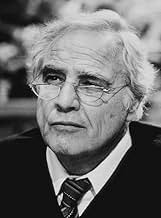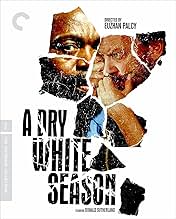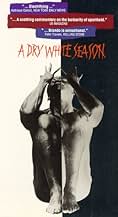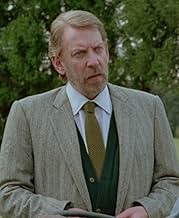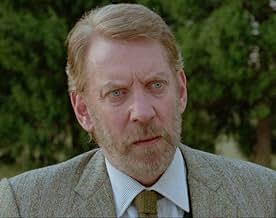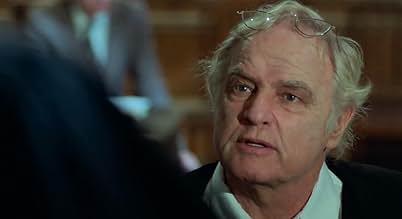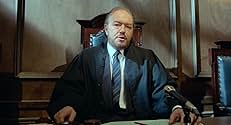NOTE IMDb
7,0/10
6,7 k
MA NOTE
Un banlieusard sud-africain blanc de la classe moyenne sans intérêt pour la politique accepte d'aider son jardinier noir à retrouver son fils emprisonné.Un banlieusard sud-africain blanc de la classe moyenne sans intérêt pour la politique accepte d'aider son jardinier noir à retrouver son fils emprisonné.Un banlieusard sud-africain blanc de la classe moyenne sans intérêt pour la politique accepte d'aider son jardinier noir à retrouver son fils emprisonné.
- Réalisation
- Scénario
- Casting principal
- Nommé pour 1 Oscar
- 2 victoires et 9 nominations au total
Jürgen Prochnow
- Captain Stolz
- (as Jurgen Prochnow)
David de Keyser
- Susan's Father
- (as David De Keyser)
Avis à la une
We are Mrs Cisar's pupils in Dumont d'Urville high school in Caen, France. We are sixteen and we study in the 11th grade. We have been learning English for six years. We watched the film A Dry White Season in the English class and we had to sum up and give our opinion on this film.
The film takes place in South Africa, during Apartheid in 1976. A white man (Ben), who is a teacher in a white school decided to defend his gardener who was beaten to death by the police. It's the story of a white person who wants to help the blacks in their fight against segregation.
We liked this film because it made us understand the horrible situation in South Africa during Apartheid. We could never have imagined that this kind of things could have happened there, so it taught us what life during Apartheid was like. That makes the film very educational for everybody and makes our mentalities evolve. The film is very interesting because there is suspense and we didn't know if justice would be done. It also showed us that people should not be judged on the colour of their skins, but on their characters.
Even if this film is very shocking sometimes and violent, we recommended it to our friends in order to make them understand what Apartheid was and what segregation is. This is still a burning issue in our society.
Watch this film and you will know what Apartheid was really about;
Thomas Alexis Gautier Ewan
The film takes place in South Africa, during Apartheid in 1976. A white man (Ben), who is a teacher in a white school decided to defend his gardener who was beaten to death by the police. It's the story of a white person who wants to help the blacks in their fight against segregation.
We liked this film because it made us understand the horrible situation in South Africa during Apartheid. We could never have imagined that this kind of things could have happened there, so it taught us what life during Apartheid was like. That makes the film very educational for everybody and makes our mentalities evolve. The film is very interesting because there is suspense and we didn't know if justice would be done. It also showed us that people should not be judged on the colour of their skins, but on their characters.
Even if this film is very shocking sometimes and violent, we recommended it to our friends in order to make them understand what Apartheid was and what segregation is. This is still a burning issue in our society.
Watch this film and you will know what Apartheid was really about;
Thomas Alexis Gautier Ewan
We are pupils in the10th grade in Dumont d'Urville in Normandy (France). We are all sixteen and we have been learning English for six years. We watched the film A dry white season in class and we had to write a review on it.
It is a film shot by Euzhan Palcy in 1997 which is based from a novel by André Brink.
The main characters are Ben du Toit played by Donald Sutherland, Captain Stolz played by Jürgen Prochnow, Stanley played by Zakes Mokae and Gordon played by Winston Ntshona.
The plot deals with apartheid in South Africa in 1976. A naïve history teacher Ben du Toit decides to avenge his gardener's death, Gordon, a black man. He is tortured to death by the white police. Ben becomes aware of the issue of segregation in his country and he sides with the blacks.
We all liked this film because it gave another vision of apartheid, more shocking and violent than the one we had imagined. This film is educative because too many people ignore what white men did to the blacks at that time and even recently. Nowadays, colored people endure discrimination in many countries even if apartheid, slavery have been abolished, so it is a very interesting film, it shows a real and current problem : racism which still exists in our society. We don't know if it can make people's mentalities evolve but it will certainly make people question themselves.
We would recommend this film to our friends because we think people are not informed enough about apartheid.
It is a film shot by Euzhan Palcy in 1997 which is based from a novel by André Brink.
The main characters are Ben du Toit played by Donald Sutherland, Captain Stolz played by Jürgen Prochnow, Stanley played by Zakes Mokae and Gordon played by Winston Ntshona.
The plot deals with apartheid in South Africa in 1976. A naïve history teacher Ben du Toit decides to avenge his gardener's death, Gordon, a black man. He is tortured to death by the white police. Ben becomes aware of the issue of segregation in his country and he sides with the blacks.
We all liked this film because it gave another vision of apartheid, more shocking and violent than the one we had imagined. This film is educative because too many people ignore what white men did to the blacks at that time and even recently. Nowadays, colored people endure discrimination in many countries even if apartheid, slavery have been abolished, so it is a very interesting film, it shows a real and current problem : racism which still exists in our society. We don't know if it can make people's mentalities evolve but it will certainly make people question themselves.
We would recommend this film to our friends because we think people are not informed enough about apartheid.
It's 1976. Ben du Toit (Donald Sutherland) is a liberal South African schoolmaster and a former rugby star. He is shocked by the police beating of his gardener Gordon's son but does nothing. When the kids gather to protest the teaching of Afrikaans, the police reply with violence. Gordon's son goes missing. Ben, in his sheltered life, tries to help and the police tells him that he's dead. Ben again advises Gordon to leave it alone. Gordon continues to investigate and gets arrested. Captain Stolz (Jürgen Prochnow) is the man in charge of torturing Gordon. Gordon's wife brings lawyer Stanley Makhaya (Zakes Mokae). The police claims that Gordon committed suicide. Stanley brings Ben to the Soweto township and shown the truth of his torture. Melanie Bruwer (Susan Sarandon) is a newspaper reporter. Civil rights lawyer Ian McKenzie (Marlon Brando) relents to Ben and takes on the case.
Ben is a clueless idiot at the start of the movie and that is the part that I dislike most about the movie. It would be so much better for Ben to be in denial. Sutherland plays it so wide eye and ill-informed. It would be more dramatic and better as character development that he doesn't come off as ignorant at the beginning. The court case in the middle drags on a little too much. It's often hard to switch into court like that. There isn't the shock of revelation since the movie already showed the torture earlier. This is also very heavy handed. This feels like a sermon more than a drama. Having Marlon Brando there pontificating doesn't help. The other problem is that after the court case, the movie goes back to the white folks. Even though it's not the movie intention, the black folks get sidelined. Nevertheless, it's an interesting attempt at bringing South Africa to the big screen.
Ben is a clueless idiot at the start of the movie and that is the part that I dislike most about the movie. It would be so much better for Ben to be in denial. Sutherland plays it so wide eye and ill-informed. It would be more dramatic and better as character development that he doesn't come off as ignorant at the beginning. The court case in the middle drags on a little too much. It's often hard to switch into court like that. There isn't the shock of revelation since the movie already showed the torture earlier. This is also very heavy handed. This feels like a sermon more than a drama. Having Marlon Brando there pontificating doesn't help. The other problem is that after the court case, the movie goes back to the white folks. Even though it's not the movie intention, the black folks get sidelined. Nevertheless, it's an interesting attempt at bringing South Africa to the big screen.
Donald Sutherland (one of Hollywood's most undervalued actors) is simply brilliant in this quiet and thought-provoking films. Many black people do not like to see white heroes in films about apartheid or racism. But the truth is, there are many white people who have contributed to the fight for justice, not for black people, but for humanity.
Marlon Brando is also fantastic. Unfortunately, Susan Sarandon's role is quite minimal.
The film is about a white teacher in a posh boys school (whites only) whose gardener asks for his help when his son is arrested and beaten up. The son later dies and the father seeks justice. Sutherland's character is faced with the reality that being a good person and minding one's own business may not be enough, especially when he realises that more is going on in his country than he knows about. As another reviewer has said, Marlon Brando's lawyer character perfectly showcases a brilliant man who has given himself to hopeless causes. he expertly shows in court the injustice that is going on. We see how the legal system worked for the oppressors; knowing this, Brando's character does it anyway. It is the principle that counts. Much like (in a totally different kind of film) King Theoden's words in the Lord of the Rings:The Return of the King, when it is noted that in no way will his army defeat the enemy, replies, 'yes, but we will meet them in battle all the same.' It was people like this who gave of themselves for the sake of others, maybe in future generations to which many of us owe our freedom.
Marlon Brando is also fantastic. Unfortunately, Susan Sarandon's role is quite minimal.
The film is about a white teacher in a posh boys school (whites only) whose gardener asks for his help when his son is arrested and beaten up. The son later dies and the father seeks justice. Sutherland's character is faced with the reality that being a good person and minding one's own business may not be enough, especially when he realises that more is going on in his country than he knows about. As another reviewer has said, Marlon Brando's lawyer character perfectly showcases a brilliant man who has given himself to hopeless causes. he expertly shows in court the injustice that is going on. We see how the legal system worked for the oppressors; knowing this, Brando's character does it anyway. It is the principle that counts. Much like (in a totally different kind of film) King Theoden's words in the Lord of the Rings:The Return of the King, when it is noted that in no way will his army defeat the enemy, replies, 'yes, but we will meet them in battle all the same.' It was people like this who gave of themselves for the sake of others, maybe in future generations to which many of us owe our freedom.
It took the cause and message of A Dry White Season for Marlon Brando to leave his self-imposed exile in Tahiti to come back to the screen, albeit in a small supporting role. Still the cause was one of the most remarkable in the 20th Century, the eventually successful opposition to the white apartheid government of the Union of South Africa.
A Dry White Season was originally a novel concerned with the aftermath of the famous Soweto Massacre when South African troops fired on a protest of black Bantu children being forced to learn in Afrikaans the language of the oppressor as Desmond Tutu so eloquently put it.
The son of the gardener at Donald Sutherland's estate is killed in Soweto and his body is not returned. After which the gardener Winston Ntshona is picked up by the special branch of the South African Police for asking too many questions and later he dies in prison the result of a suicide which no one with a functioning brain believes. At that point Sutherland decides to intervene himself.
Sutherland plays a history teacher in a white only school and as he learns about what's going on and starts asking the questions he dare not ask before even to himself. His radicalization is total, but it costs him dear, his wife Janet Suzman and his daughter Sussanah Harker leave him, but his young son Rowen Elnes sticks with dad.
It's not that he doesn't gain a few new friends, African National Congress organizer Zakes Mokae, crusading journalist Susan Sarandon, and human rights attorney Marlon Brando. But he also gains a bitter and malevolent enemy in Special Branch Captain Jurgen Prochnow who apparently does damage control for the government. That includes outright murder of suspected opposition to the apartheid government.
Every actor worth his salt loves a courtroom scene and Marlon Brando might have even come back for that in this film as well as the anti- apartheid cause. He got the film's only Academy Award nomination for Best Supporting Actor, but lost to Denzel Washington for Glory. I suspect given Marlon's history with Oscar folks were reluctant to vote for him.
The film really belongs to star Donald Sutherland though and I think it a pity he wasn't given any Oscar nomination for this fine film with an eternal message about freedom.
A Dry White Season was originally a novel concerned with the aftermath of the famous Soweto Massacre when South African troops fired on a protest of black Bantu children being forced to learn in Afrikaans the language of the oppressor as Desmond Tutu so eloquently put it.
The son of the gardener at Donald Sutherland's estate is killed in Soweto and his body is not returned. After which the gardener Winston Ntshona is picked up by the special branch of the South African Police for asking too many questions and later he dies in prison the result of a suicide which no one with a functioning brain believes. At that point Sutherland decides to intervene himself.
Sutherland plays a history teacher in a white only school and as he learns about what's going on and starts asking the questions he dare not ask before even to himself. His radicalization is total, but it costs him dear, his wife Janet Suzman and his daughter Sussanah Harker leave him, but his young son Rowen Elnes sticks with dad.
It's not that he doesn't gain a few new friends, African National Congress organizer Zakes Mokae, crusading journalist Susan Sarandon, and human rights attorney Marlon Brando. But he also gains a bitter and malevolent enemy in Special Branch Captain Jurgen Prochnow who apparently does damage control for the government. That includes outright murder of suspected opposition to the apartheid government.
Every actor worth his salt loves a courtroom scene and Marlon Brando might have even come back for that in this film as well as the anti- apartheid cause. He got the film's only Academy Award nomination for Best Supporting Actor, but lost to Denzel Washington for Glory. I suspect given Marlon's history with Oscar folks were reluctant to vote for him.
The film really belongs to star Donald Sutherland though and I think it a pity he wasn't given any Oscar nomination for this fine film with an eternal message about freedom.
Le saviez-vous
- AnecdotesWith this movie, writer and director Euzhan Palcy became the first Black woman to direct a major Hollywood movie.
- GaffesWhen the camera pulls away from the court house (Harare City Hall) a bus drives past displaying an advertisement for Balkan Bulgarian Airlines, which flew to Zimbabwe, but not to South Africa under apartheid during the 1970s.
- Citations
Ian McKenzie: Justice and law, Mr. Du Toit, are often just... well they're, I suppose they can be described as distant cousins. And here in South Africa, well, they're simply not on speaking terms at all.
- Bandes originalesUnomatheba
Written by Joseph Shabalala
Performed by Ladysmith Black Mambazo
Courtesy of Warner Bros. Records
Produced by Danny Lawson for Night After Night, Ltd.
Meilleurs choix
Connectez-vous pour évaluer et suivre la liste de favoris afin de recevoir des recommandations personnalisées
- How long is A Dry White Season?Alimenté par Alexa
Détails
Box-office
- Budget
- 9 000 000 $US (estimé)
- Montant brut aux États-Unis et au Canada
- 3 766 879 $US
- Week-end de sortie aux États-Unis et au Canada
- 202 507 $US
- 24 sept. 1989
- Montant brut mondial
- 3 766 879 $US
- Durée1 heure 46 minutes
- Couleur
- Mixage
- Rapport de forme
- 1.85 : 1
Contribuer à cette page
Suggérer une modification ou ajouter du contenu manquant


